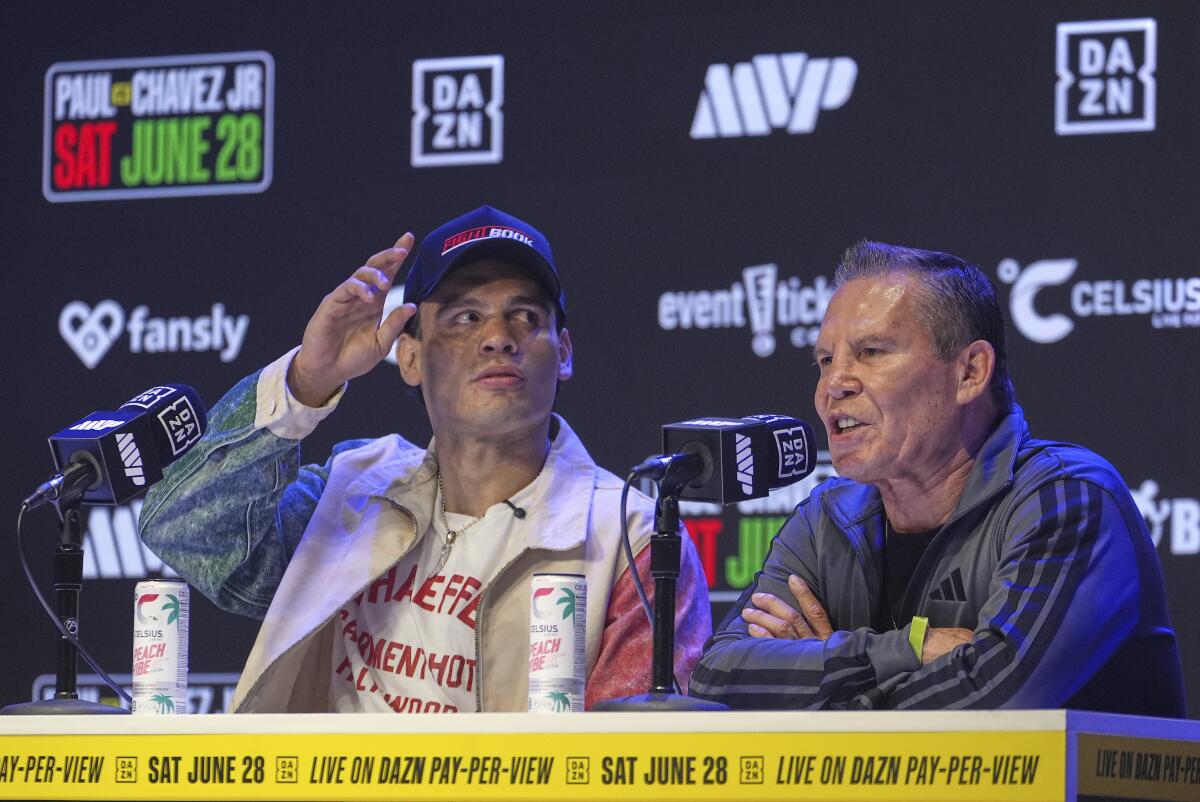MEXICO CITY — Julio César Chávez Jr., whose high-profile boxing career was marred by substance abuse and other struggles and never approached the heights of his legendary father, was in Mexican custody Tuesday after being deported from the United States.
His expulsion had been expected since July, when Immigration and Customs Enforcement arrested him outside his Studio City home and accused him of making “fraudulent statements” on his application to become a U.S. permanent resident.
In Mexico, Chávez, 39, faces charges of organized crime affiliation and arms trafficking, Mexican authorities say.
He is the son of Julio César Chávez — widely regarded as Mexico’s greatest boxer — and spent his career in the shadow of his fabled father.
Boxers Julio César Chávez, right, and his son Julio César Chávez Jr., during a news conference in Los Angeles in May.
(Damian Dovarganes / Associated Press)
His father both supported his troubled son and chastised his namesake, whose struggles included substance abuse, legal troubles and challenges in making weight for his bouts.
Despite his highly publicized problems, Chávez won the World Boxing Council middleweight title in 2011 before losing the belt the following year.
Chávez was turned over to Mexican law enforcement authorities at the Arizona border and was being held Tuesday in a federal lockup in Hermosillo, the capital of Sonora state, authorities here said.
During her regular morning news conference, Mexican President Claudia Sheinbaum confirmed that the boxer was in Mexican custody.
Days before his July arrest in Studio City, Chávez faced off in Anaheim for his last bout — against Jake Paul, the influencer-turned-pugilist. Chávez lost the fight.
When he was arrested in July, U.S. authorities labeled Chávez an “affiliate” of the Sinaloa cartel, which is one of Mexico’s largest — and most lethal — drug-trafficking syndicates.
Jake Paul, right, and Julio César Chávez Jr., left, exchange punches during their cruiserweight bout in Anaheim on June 28.
(Anadolu / Anadolu via Getty Images)
Chávez has faced criticism over alleged associations with cartel figures, including Ovidio Guzmán, a son of infamous drug lord Joaquín “El Chapo” Guzmán, now serving a life sentence in a U.S prison for his leadership role in the Sinaloa cartel. Ovidio Guzmán recently pleaded guilty to drug-trafficking and other charges in federal court in Chicago and is reported to be cooperating with U.S. prosecutors.
Controversies have long overshadowed the career of Chávez.
Chávez served 13 days in jail for a 2012 drunk-driving conviction in Los Angeles County and was arrested by Los Angeles police in January 2024 on gun charges. According to his attorney, Michael Goldstein, a court adjudicating the gun case granted Chávez a “mental health diversion,” which, in some cases, can lead to dismissal of criminal charges.
“I’m confident that the issues in Mexico will be cleared up, and he’ll be able to continue with his mental health diversion” in California, Goldstein said.
A lingering question in the case is why Chávez was apparently allowed to travel freely between the United States and Mexico on several occasions despite a Mexican arrest warrant issued against him in March 2023.
On Jan. 4, 2025, according to the Department of Homeland Security, Chávez reentered the United States from Tijuana into San Diego via the San Ysidro port of entry. He was permitted in despite the pending Mexican arrest warrant and a U.S. determination just a few weeks earlier that Chávez represented “an egregious public safety threat,” the DHS stated in a July 3 news release revealing the boxer’s detention.
Homeland Security said that the Biden administration — which was still in charge at the time of Chávez’s January entry — had determined that the boxer “was not an immigration enforcement priority.”
While in training for the Paul match, Chávez spoke out publicly against President Trump’s ramped-up deportation agenda, which has sparked protests and denunciations across California. In an interview with the Los Angeles Times, he accused the administration of “attacking” Latinos.
Chávez told The Times: “I wouldn’t want to be deported.”
McDonnell reported from Mexico City and El Reda from Los Angeles. Special correspondent Cecilia Sánchez Vidal in Mexico City contributed to this report.
